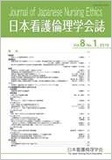Japanese
English
- 販売していません
- Abstract 文献概要
- 参考文献 Reference
- サイト内被引用 Cited by
研究目的は、看護師が日頃行っている排泄援助はどのような日常倫理に支えられているのかを明らかにすることである。研究対象者はある総合病院に勤務する看護師17名で、参加観察を行ったあとに半構成的面接法でデータを収集し、質的帰納的に分析を行った。日常倫理からみた看護師が行う排泄援助は、【排泄は人間にとって当たり前のこと】【するべきところで、自分で、ゆっくり、すっきりできるようにしたい】【嫌だろうなあ】【気配を消す】【やりとりしながらすすめる】【慣れたらいかんなあ】の6つのカテゴリで構成された。さらに文脈から【やりとりしながらすすめる】パターンと、【嫌だろうなあ】パターンとの二つの排泄援助パターンが見出された。【やりとりしながらすすめる】パターンで看護師が大切にしていた【気配を消す】は、排泄援助を支える重要な日常倫理であることが示唆された。
The goal of the present study was to elucidate the types of everyday ethics that sustain the eliminative behavior support provided by nurses. Seventeen nurses working at a general hospital participated in the present study. After participant observation, data were collected through semi-structured interviews and then qualitatively and inductively analyzed. Eliminative behavior support performed by nurses from the perspective of everyday ethics fell into six categories: “Elimination is normal for humans,” “Elimination should be done where it is desired, by oneself, at one's own pace, to completion,” “It is surely unpleasant for the patient,” “I minimize my presence,” “Communication is maintained throughout,” and “I should not become accustomed to this.” In context, two distinct patterns of eliminative behavior support were seen: “Communication is maintained throughout” and “It is surely unpleasant for the patient.” The notion of “minimizing the nurse's presence,” which was highly valued by nurses for “maintaining communication throughout,” appears to be an important aspect of everyday ethics in eliminative behavior support.
Copyright © 2016, The Japan Nursing Ethics Associatin. All rights reserved.


